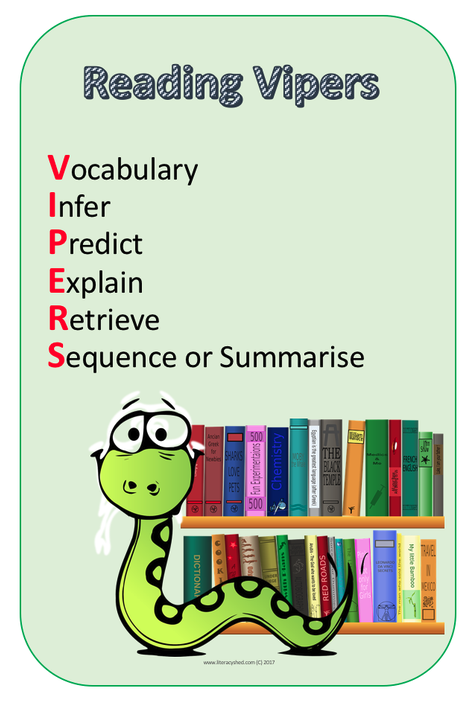English - Reading and Phonics
Reading and Phonics

We use the VIPERS approach to developing Reading Comprehension across school to help the children master their skills in the various domains of comprehension.
The acronym helps children to remember the different skills they use during comprehension to make sense of texts. It helps adults in school and at home ensure that they focus on all the various skills of comprehension.
In school comprehension skills are developed through whole class and small group sessions focusing on both verbal and written responses.
Support is available for parents; an information book is sent home at the beginning of the year (copies can be found below) and reminders are included on the weekly homework sheets published on ClassDojo.
Reading Progression
Reading-Progression (ID 1098)
Reading Schemes
We place a large emphasis on the teaching of reading in our school.
In Reception and Year 1 our core reading scheme is "Collins Big Cat". This is a fully decodable sheme which links in with our Phonics Scheme (Little Wandle Letters and Sounds).
From Year 2, we currently use Oxford Reading Tree as our core scheme.
To enable our children to experience texts which are not fully decodable, we complement the core schemes with a wide variety of published schemes:
- Oxford Reading Tree (including Project X)
- All Aboard
- Project X
- Rigby Star
- Investigate (Scholastic)
The children also read and experience many books through daily classroom activities and time in the school library.
Reading at Home
Handy hints for supporting children at home - tailored to the colours bands from pink to lime.
Supporting Your Child at Home Through the Colour Bands
Recommended Books by Year Group
100 books recommended for each year group ... recommended by our friends at Peters bookshop.
Phonics Progression
Phonics Scheme and the Year 1 Phonics Check
In Reception and Year One, we have implemented and follow the Little Wandle Phonics programme as our primary systematic approach to teaching Early Reading and Phonics. Our systematic approach is adopted by all teaching and support staff to ensure a consistent approach. This is monitored regularly.
Why learning to read is so important:
- Phonics is the only route to decoding
- Learning to say the phonic sounds
- By blending phonic sounds to read words
- Increasing the child’s fluency in reading sounds, words and books
Reading fully decodable books
- Children must read books consistent with their phonic knowledge
- It is essential not to use other strategies to work out words (including guessing words, deducing meaning from pictures, grammar, context clues or whole word recognition)
- Books must be fully decodable and follow the Little Wandle scheme
- Children need to read books in a progressive sequence until they can decode unfamiliar words confidently
The role of Parents’ and Carers’
- Have a positive impact on their child’s reading
- Should model the importance of reading practice to develop fluency
- Children take home books they have read at school to re-read at home to build fluency
- There are two different types of books that pupils bring home: reading practice and books to share for pleasure
- Reading at home encourages a love of books, along with developing vocabulary and discussion
- Parents should use voices, expression, discuss unfamiliar vocabulary, talk about the pictures, and predict what might happen next
- Give positive yet informative feedback by commenting on their child profile on class dojo
Library book
In order to encourage your child to become a lifelong reader, it is important that they learn to read for pleasure. The children will have the opportunity to select their own book from our school library. Please remember that you shouldn’t expect your child to read this alone. Read it to or with them. Discuss the pictures, enjoy the story, predict what might happen next, use different voices for the characters or explore the facts in a non-fiction book. The main thing is that you have fun.
Any child in Year Two or above who cannot read at age-related expectations will be assessed and moved onto the Rapid Catch-Up Programme if necessary.
Phonics Screening Check
Towards the end of Year 1, children sit the national Phonics Screening Check where they are asked to read a series of 40 words and non-words. This was introduced in 2012. The daily phonics teaching in Reception and Year 1 prepares the children for this check. Support is given to parents through Parent Workshops held early in the year.
Children who do not achieve the expected standard receive more focussed or additional teaching as they enter Year 2.
For those children who enter the juniors with weaker phonics skills, targetted support is put into place to improve their phonic and spelling skills.
Phonics Resources
Letters and Sounds: A website giving information and games for each of the phonic phases
Phonics Play: Lots of games to help your child with their phonics work - please ask your child's teacher for the login details
BBC Phonics: Games to help practice using phonics for spelling
Mr T's Phonics: A video clip for each phoneme (plus lots of other useful tips for helping your child with reading and phonics)




